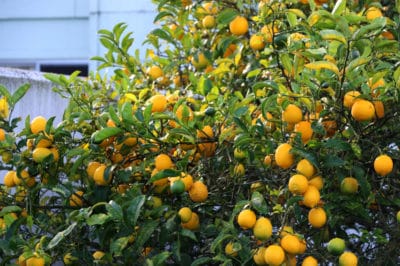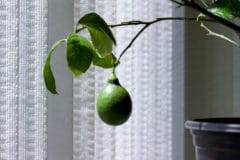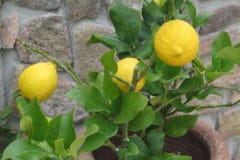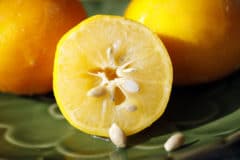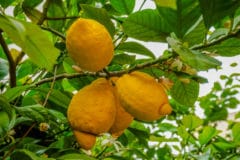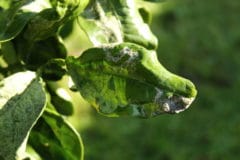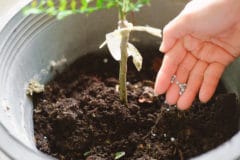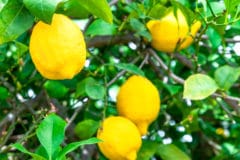Watering
Whether your Meyer lemon tree grows in the ground or in a pot, the same rule applies: Underwatering is more easily remedied than overwatering. To avoid the latter, give your tree loose, well-draining soil or a potting mix formulated for citrus.
Water when the soil is slightly dry (not parched) to the touch. The goal is to keep the roots consistently moist without letting them become soggy. If the soil becomes too dry, you may be tempted to compensate by overwatering.
Expert gardener’s tip: Always water slowly and deeply, so the moisture reaches the deepest roots. A potted tree with a limited soil supply needs more frequent watering than an in-ground one.
Fertilizing
As heavy feeders, Meyer lemons need regular fertilizer applications during growing season. To keep them at their fruit-producing peak — and ensure a chemical-free harvest — use an organic, slow-release 6-3-3 fertilizer fortified with essential trace minerals including:
- Boron
- Calcium
- Copper
- Manganese
- Zinc
When and How to Fertilize
Make the first application just before your tree blooms in late winter or early spring. Repeat as soon as the flowering ends and again in early to mid-summer.
Spread the fertilizer granules evenly over the soil starting 6 inches from the trunk and going to the edge of the canopy. Use the label’s recommended rate, because different brands come in different strengths.
Work the granules into the soil and water well.
Frost Protection
Meyer lemons grow in USDA plant hardiness zones 8 through 11. They’ve been known survive a short time at 20°F (-1.1°C), but it’s best to protect them with frost blankets when temperatures lower than 23°F (5°C) are expected. Otherwise, their fruit and leaves will suffer.
Pest Management
Common Meyer lemon pests include:
- Aphids
- Scale
- Whiteflies
- Mealybugs
- Mites
The first four drain sap from the leaves. They also drench the trees with gooey, clear waste, or honeydew, that attracts streams of ants. Mites also feed on leaf fluids, but seldom do serious damage.
Pest Control
To eradicate all these pests without harming bees or other beneficial insects, spray your tree to runoff with organic insecticidal soap. Repeat every three days until the infestation is gone.
